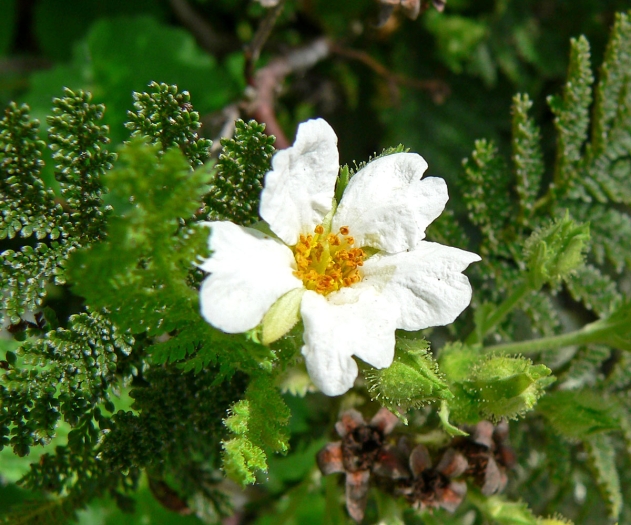Mountain Misery
(Chamaebatia foliolosa)
Mountain Misery (Chamaebatia foliolosa)
/
/

Stan Shebs
CC BY-SA 3.0
Image By:
Stan Shebs
Recorded By:
Copyright:
CC BY-SA 3.0
Copyright Notice:
Photo by: Stan Shebs | License Type: CC BY-SA 3.0 | License URL: https://creativecommons.org/licenses/by-sa/3.0 | Uploader: Stan Shebs | Publisher: Wikimedia Commons | Title: Chamaebatia_foliolosa_2.jpg | Notes: {{Information| |Description=[[:it:Riserva Naturale Orientata dello Zingaro|Riserva naturale dello Zingaro]], Sicily ''[[Chamaerops humilis]]'' |Source=personal work |Date=1 November 2006 |Author=[[User:Esculapio|tato grasso]] |Permission=Attribution Sha |


























































Estimated Native Range
Summary
Chamaebatia foliolosa, commonly known as Mountain Misery, is an evergreen subshrub or shrub native to the chaparral and mixed conifer forests of California, particularly in the Sierra Nevada and Coastal Ranges. It typically grows to a height of 1-2 feet (0.3-0.6 meters) and spreads 4-6 feet (1.2-1.8 meters) wide. The plant forms a dense mat of fern-like leaves that are sticky and aromatic, with a distinctive pungent scent. The leaves are compound, with three leaflets, and are covered in fine hairs. The small, roselike flowers appear in late spring to early summer, featuring rounded white petals and prominent yellow centers surrounded by numerous stamens, creating a showy display.
Mountain Misery is valued for its ground-covering abilities, particularly in erosion control and restoration projects. Its aromatic foliage and flowers can be a unique addition to native plant gardens, and it is also used for its nitrogen-fixing properties, which can improve soil fertility. However, its sticky black gum can be a nuisance as it adheres to clothing and tools, and the plant’s high resin content makes it highly flammable, posing a fire risk in dry conditions. In cultivation, it prefers full sun to part shade, requires low to medium water, and thrives in well-drained soils. While it is not commonly found in the horticultural trade, it can be propagated by seed or cuttings.CC BY-SA 4.0
Mountain Misery is valued for its ground-covering abilities, particularly in erosion control and restoration projects. Its aromatic foliage and flowers can be a unique addition to native plant gardens, and it is also used for its nitrogen-fixing properties, which can improve soil fertility. However, its sticky black gum can be a nuisance as it adheres to clothing and tools, and the plant’s high resin content makes it highly flammable, posing a fire risk in dry conditions. In cultivation, it prefers full sun to part shade, requires low to medium water, and thrives in well-drained soils. While it is not commonly found in the horticultural trade, it can be propagated by seed or cuttings.CC BY-SA 4.0
Plant Description
- Plant Type: Subshrub, Shrub
- Height: 2-4 feet
- Width: 2-3 feet
- Growth Rate: Moderate
- Flower Color: White
- Flowering Season: Spring
- Leaf Retention: Evergreen
Growth Requirements
- Sun: Full Sun, Part Shade
- Water: Low, Medium
- Drainage: Medium
Common Uses
Drought Tolerant, Low Maintenance
Natural Habitat
Chaparral and mixed conifer forests of California, particularly in the Sierra Nevada and Coastal Ranges
Other Names
Common Names: Bearclover
Scientific Names: , Chamaebatia foliolosa,
GBIF Accepted Name: Chamaebatia foliolosa Benth.